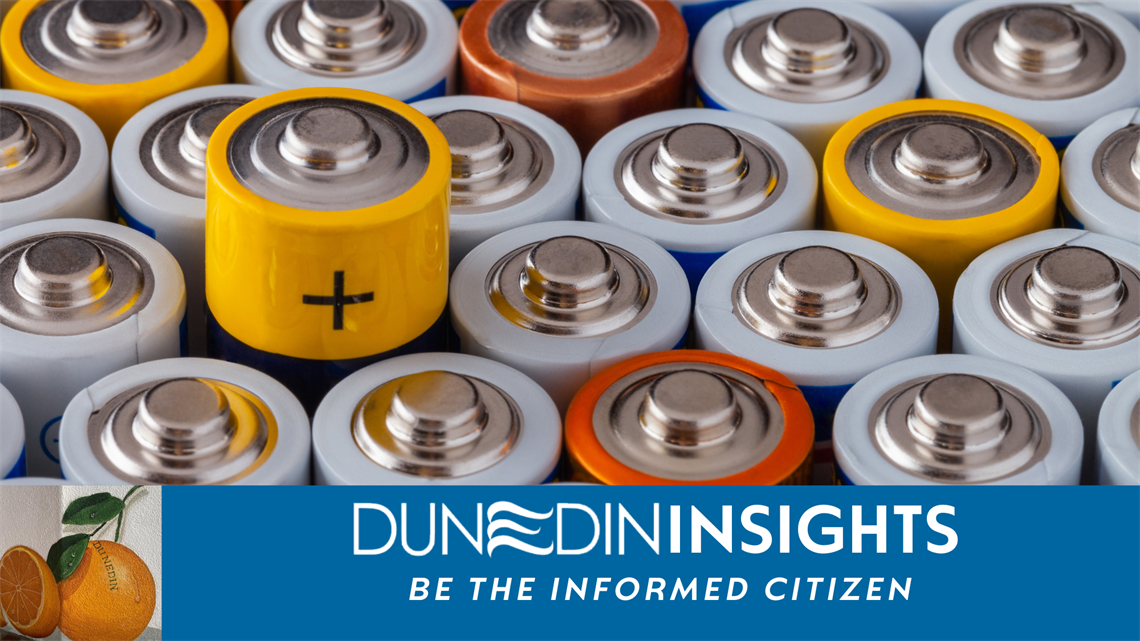Let’s Talk Trash: Batteries
Published on July 24, 2025

Savannah Bunch, Environmental Specialist 1
In this edition of Dunedin Insights, we’re digging into something small, sneaky, and sometimes explosive: batteries.
They power our lives, from toothbrushes, to earbuds, to laptops. But what happens when those devices die? Too many end up in the wrong bin—and that’s when the real trouble starts. You’ve probably tossed a few in the trash without thinking twice. But here’s the issue: some batteries can (and do) catch fire in garbage trucks, including our own. These aren’t urban legends. In the last year, Dunedin has experienced at least three close calls, including a fire at our 2024 SHREDFEST event. A battery buried in shredded paper ignited inside the truck, forcing staff to dump the load into the street while the fire department extinguished the flames.
So buckle up. It’s time to power up our battery knowledge.
Why Are Lithium Batteries Everywhere?
Lithium-ion batteries are the rechargeable MVPs of modern life. They can be found in phones and laptops, wireless earbuds, power tools, e-scooters and bikes, vapes, electric toothbrushes, and even toys for kids.
Why so popular? Because they’re:
- Lightweight
- Long-lasting
- Fast to recharge
- Capable of packing big energy into a small package
That’s good for technology. Not so good for waste.
Trashy Science Time
Traditional alkaline batteries (like AA and AAA) rely on a chemical reaction between zinc and manganese dioxide. When they’re depleted, they are mostly inert—meaning they no longer pose a chemical risk. That’s why it’s safe to toss them in your regular household trash.
Fun fact: Single-use batteries used to contain mercury, making them hazardous and difficult to dispose of properly. However, due to regulation and innovation, most alkaline batteries sold in the U.S. today are mercury-free. It's a small win in the battery battle!
Now enter lithium-ion batteries. These little power packs tell a different story. They’re constructed with highly reactive materials and densely packed with energy. Inside, a thin separator prevents the positive and negative parts from making contact. However, if that separator becomes damaged, say, crushed in a garbage truck compactor, it can short-circuit and initiate a chemical chain reaction known as thermal runaway. That’s when the temperature soars uncontrollably, gases accumulate, and the battery can catch fire or even explode.
These fires are fast, hot, and tough to put out. The EPA documented over 245 fires at waste and recycling facilities linked to lithium-ion batteries from 2013 to 2020 (EPA, 2021) and the numbers are still rising.
But if disposing of batteries feels like a never-ending game of tug-of-war, you’re not alone. When we think we’ve figured it out, the technology evolves—and so do the rules. Clemson University put it plainly: as our world becomes more electrified, the risks of improper battery disposal grow with it. But this isn’t about panic—it’s about being attentive. With a few simple habits, we can keep ourselves, our workers, and our city safe.
The Do’s and Do Not’s
DO NOT
Let’s be 100% clear: Never put rechargeable batteries in your garbage or recycling bin.
That includes:
- Lithium-ion
- Nickel-Cadmium (Ni-Cd)
- Nickel Metal Hydride (NiMH)
- Sealed lead-acid
- Anything that plugs in to charge
Even if it doesn’t resemble a battery—like a vape, Bluetooth speaker, or robot vacuum—if it’s rechargeable, it can pose a danger.
DO
Alkaline batteries (single-use AA, AAA, etc.) are safe for disposal in the trash. Just tape over the terminals if you’re discarding several at once, especially 9-volts—they can still spark if they touch.
Need a general rule of thumb? If it charges, it needs to be dropped off.
Why It Matters: The Local Cost of Fires
Here’s where it resonates: A Dunedin garbage truck costs about $500,000. If a battery fire damages one, it can take years to replace.
That isn’t just an inconvenience—it’s a serious setback for city operations, your utility costs, and the safety of our staff. These fires happen quickly. And the damage? Expensive, dangerous, and entirely preventable.
Where to Take Your Batteries
Pinellas County handles these guys and anything else that is considered hazardous. You can visit their standing facility at 2855 109th Ave N, St. Petersburg, FL, or attend a collection event on select Saturdays at 29582 U.S. 19 N, Clearwater, FL.
The next two collection events are July 26th and August 9th from 9 am – 2 pm. For more information, check them out here: Pinellas Household Hazardous Waste
Battery Dos & Don’ts
|
Battery Type
|
Disposal Method
|
|
Alkaline (AA, AAA, C, D, 9V)
|
Trash bin
|
|
Rechargeable Batteries
|
County HHW site only
|
If improper batteries and waste are left at the Solid Waste office, that is considered illegal dumping. The Dunedin Solid Waste office no longer accepts battery drop-offs of any kind. Illegal dumping is a fineable offense under the Florida Litter Law.
Sources: